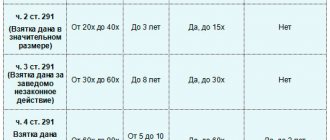One of the special crimes against justice is provocation of a bribe. Under the provocation of a bribe or commercial bribery, the criminal law means an attempt to transfer to an official or a person performing managerial functions in commercial organizations, without his consent, money, valuables, property or the provision of property-related services to him, for the purpose of artificially creating evidence of a crime or blackmail.
Article 304 of the Criminal Code of the Russian Federation contains only one simple composition, the disposition of which is indicated above. Provocation of a bribe is a crime of medium gravity and carries a maximum penalty of five years in prison.
From a legal point of view, the provocation of a bribe or commercial bribery should be understood as the deliberate creation by the provocateur of a situation that pushes or forces the victim to perform actions beneficial to the provocateur - to receive a bribe. The main goal of the provocateur is to create the appearance that an official or commercial employee has received a bribe, thus artificially creating evidence of the commission of crimes under Art. 290 of the Criminal Code of the Russian Federation Receiving a bribe, or Art. 204 of the Criminal Code of the Russian Federation Commercial bribery. The bribe can be left in the victim’s office, transferred to relatives, transferred to an account, the main condition for the formation of Art. 304 of the Criminal Code of the Russian Federation, this must be done without the knowledge and consent of the bribe-taker.
Since Art.
304 of the Criminal Code of the Russian Federation Provocation of a bribe is closely related to Art. 290 of the Criminal Code of the Russian Federation Receiving a bribe and Art. 204 of the Criminal Code of the Russian Federation Commercial bribery, at the initial stage after the very event of transferring (leaving) money or valuables, an ambiguous legal situation arises - which of the participants in the events committed the crime and who was the victim, what was committed, receiving a bribe, commercial bribery, or the bribe was provoked. If the bribe was made under operational support, then it will be possible to prove provocation and achieve termination of the case of receiving a bribe or commercial bribery only at the investigation stage, since operational measures are prepared in advance, the investigator receives already compiled material containing certain signs, and the timing of the procedural decision and the management They are often under pressure and give the command to initiate a case. CRIMINAL LAWYER call now: ☎ 8 (495) 532-75-40
If you face liability for provoking a bribe, protection under Art. 304 of the Criminal Code of the Russian Federation
The defense of provocation of a bribe can use the facts of extortion of money or valuables from the victims prior to the bribe, and demands for their transfer for certain actions. A bribery solicitation lawyer will study all the circumstances of the case and determine the best line of defense; everything, of course, depends on many circumstances. Charge under Art. 304 of the Criminal Code of the Russian Federation often stems from criminal cases against bribe takers, cases that were investigated for a long time and attempts to terminate and release the defendant from criminal liability for one reason or another failed. And there was only one option left - since there was no bribe, it means there was a provocation. In this case, his recent faithful servants fall under the millstone of justice and are sacrificed. Usually this process is not so fleeting, and if there are any prerequisites that the situation may turn out this way, we recommend that you get a reliable lawyer in advance and begin to take active steps. Call a lawyer in advance, provide yourself with protection in advance so that it is not too late.
Article 304 UKRF. Its difference from bribery and Article 204 of the Criminal Code.
Resolution of the Plenum of the Supreme Court of the Russian Federation dated 07/09/2013 N 24 (as amended on 12/03/2013) “On judicial practice in cases of bribery and other corruption crimes”
1. The analyzed act belongs to the category of crimes of medium gravity due to the punishment provided by the Criminal Code of the Russian Federation in the form of imprisonment with an upper limit of 5 years.
2. The act in question is in section X “Crimes against state power”; accordingly, the generic object is social relations that ensure the legitimacy and normal existence and functioning of state power in the Russian Federation.
3. The analyzed act is located in Chapter 31 “Crimes against justice”, therefore, the specific object of this group of crimes is the totality of social relations that arise in the course of the activities of the court in the administration of justice, as well as legal entities or citizens ensuring the observance of the interests of justice through the implementation of its goals and tasks and execution of judicial acts.
Justice considers the Criminal Code of the Russian Federation more broadly, since it also includes d.l., software that contribute to the administration of justice. The issue of highlighting in Chapter 31 the physical and moral protection of participants in legal proceedings, as well as their relatives, as an independent object protected by the Criminal Law is controversial.
It should be recognized that the protection of participants in legal proceedings and their relatives is justified, which is due to the fact that the specific object of crimes includes 2 groups of social relations: 1) social relations that protect procedural and post-procedural activities; 2) social relations that protect the inalienable personal benefits of the subjects of this activity and their loved ones (life, health, honor, dignity, personal safety).
4. The main direct object of the act in question is specific, and most often procedural, relations that ensure the legal activities and security of the court, as well as bodies and individuals that assist in the administration of justice by the court, as well as bodies and persons obliged to execute decisions made by the court .
5. An additional object of the act in question is the interests of the victim - the provoked official or a person performing managerial functions in a commercial or other organization.
6. Optional characteristics of the object - the victim does not affect qualifications. The subject of the act in question is money, securities, other property or the provision of services of a property nature, the provision of other property rights.
Clause 9 of the PPVSRF, the subject of bribery (Articles 290, 291 and 291.1 of the Criminal Code of the Russian Federation) and commercial bribery (Article 204 of the Criminal Code of the Russian Federation), along with money, securities, and other property, may be the illegal provision of services of a property nature and the provision of property rights.
Under the illegal provision of services of a property nature, the courts should understand the provision of any property benefits to an official as a bribe, including the release of him from property obligations (for example, the provision of a loan with a reduced interest rate for the use of it, the provision of free or at a reduced cost of tourist vouchers, repairs). apartments, construction of a summer house, transfer of property, in particular vehicles, for its temporary use, forgiveness of debt or fulfillment of obligations to other persons).
Property rights include both the right to property, including the right of claim of the creditor, and other rights that have a monetary value, for example, the exclusive right to the results of intellectual activity and means of individualization equivalent to them (Article 1225 of the Civil Code of the Russian Federation). Receiving a bribe in the form of illegally granting property rights to an official presupposes the emergence of a legally enforceable opportunity for a person to take possession or dispose of someone else’s property as his own, to demand from the debtor the fulfillment of property obligations in his favor, etc.
Property transferred as a bribe or the subject of commercial bribery, property services provided or property rights granted must receive a monetary value based on the evidence presented by the parties, including, if necessary, taking into account the expert’s opinion.
7. The disposition of the act in question is descriptive, since it does not simply name the act, but describes its main features. Reference (to Article 200.5 of the UKRF).
Positive signs –
There are no negative signs.
KP – absent.
8. According to the design of the objective side, this crime is truncated. The crime is considered completed from the moment of an attempt to transfer money, securities, or other property to the indicated persons, as well as from the moment the provision of property-related services begins. This attempt is expressed, for example, by placing money or securities in documents, a desk drawer, etc., sending them to the provoked person by mail, telegraph, transferring them to the person’s relatives allegedly with his consent, etc.
Provocation of a bribe or commercial bribery is a completed crime from the moment of transfer of property or provision of services of a property nature without the knowledge of an official or person performing managerial functions in a commercial or other organization, or despite their refusal to accept illegal remuneration.
9. A mandatory feature is:
- an act in the form of an action: provoking a bribe, commercial bribery or bribery in the field of procurement of goods, works, services to meet state or municipal needs, that is, an attempt to transfer to an official, a foreign official, an official of a public international organization, a person performing managerial functions in commercial or other organizations, or to the person specified in part one of Article 200.5 of this Code, without his consent, money, securities, other property or the provision of services of a property nature, the provision of other property rights.
A mandatory element of the crime is the lack of consent of the recipient to accept the subject of the bribe (bribery). The perpetrator of provocation creates only the appearance of a crime, imitates receiving a bribe (bribery), and the victim (the circle of persons is directly specified in the law) is in the dark about these criminal actions.
This is precisely the fundamental difference between the act in question and giving a bribe and commercial bribery, which are manifested in the transfer, respectively, to an official or a person performing managerial functions in a commercial or other organization, the subject of a bribe (bribery) for their actions (inaction) in the service of the interests of the giver or the persons represented by him, as well as for general patronage or connivance in the service. Moreover, it is obvious that these criminal actions (giving a bribe) are committed with the mutual consent of the bribe giver and the bribe recipient (the same applies to bribery).
10. An obligatory sign of the subjective side is the form of guilt - intentional. The type of intent is direct. The subject is aware that the official or person performing managerial functions does not know about the intention to transfer the subject of a bribe or bribe to him, did not express his desire to receive it, and despite these circumstances wants to transfer this illegal reward.
11. An optional feature of the subjective side - the goal, is transformed into the category of mandatory ones and affects the qualification: artificial creation of evidence of a crime or blackmail. The motive is any, it does not affect qualifications, but can be taken into account by the courts when assigning punishment.
1) artificial creation of evidence of a crime (provided for in Article 204 or Article 290 of the Criminal Code of the Russian Federation). The methods by which such evidence will be created are very diverse: alerting law enforcement agencies, secretly recording conversations, inviting witnesses, copying down the numbers of banknotes or securities, etc. If the artificial creation of evidence of a crime under Art. 204 or art. 290 of the Criminal Code of the Russian Federation, is associated with the desire to bring a person to criminal responsibility and is accompanied by the filing of an application for prosecution under Art. 204 or art. 290 of the Criminal Code of the Russian Federation or a statement of extortion of a bribe and subsequent provocation, then the actions of the perpetrator can be qualified as a set of crimes under Art. 306 of the Criminal Code of the Russian Federation;
2) blackmail. At the same time, the subject hopes that if the subject of the bribe or bribery is accepted, then in the future he will be able to present to the official or person performing management functions any demands related to his official duties, under the threat of informing law enforcement agencies or other persons about the fact of receiving a bribe, bribery.
Clause 32 of the PPVSRF, liability for provoking a bribe or commercial bribery (Article 304 of the Criminal Code of the Russian Federation) occurs only in cases where an attempt to transfer money, securities, other property or provide services of a property nature was carried out for the purpose of artificially generating evidence of a crime or blackmail and an official or a person performing managerial functions in a commercial or other organization, knowingly for the guilty person, did not perform actions indicating his consent to accept a bribe or the subject of commercial bribery, or refused to accept them.
12. The subject of the crime is a general, sane individual who has reached the age of 16 years.
Differences:
1. Generic, specific, immediate objects.
2. The purposes of committing a crime, i.e. on the subjective side. In Article 304 - a special purpose, each person receiving a bribe or commercial bribery or giving a bribe or commercial bribery pursues his own personal goals. Clause 34 of the PPVSRF of 2013:
34. From the crime provided for in Article 304 of the Criminal Code of the Russian Federation, it is necessary to distinguish inciting actions of law enforcement officers who provoked an official or a person performing managerial functions in a commercial or other organization to accept a bribe or the subject of commercial bribery.
These actions are committed in violation of the requirements of Article 5 of the Federal Law of August 12, 1995 N 144-FZ “On Operational-Investigative Activities” and consist of the transfer of a bribe or the subject of commercial bribery with the consent or at the proposal of an official or a person performing managerial functions in a commercial or another organization, when such consent or offer was obtained as a result of inducing these persons to receive valuables under circumstances indicating that without the intervention of law enforcement officers, the intent to obtain them would not have arisen and the crime would not have been committed.
The acceptance by an official or a person performing managerial functions in a commercial or other organization, under the specified circumstances, of money, securities, other property or property rights, as well as services of a property nature, cannot be regarded as a criminal offense. In this case, there is no corpus delicti in the act (clause 2 of part 1 of Article 24 of the Code of Criminal Procedure of the Russian Federation).
Art. 307 UKRF.
1. The analyzed act belongs to the category of crimes of minor gravity.
2. The act in question is in section X “Crimes against state power”; accordingly, the generic object is social relations that ensure the legitimacy and normal existence and functioning of state power in the Russian Federation.
3. The analyzed act is located in Chapter 31 “Crimes against justice”, therefore, the specific object of this group of crimes is the totality of social relations that arise in the course of the activities of the court in the administration of justice, as well as legal entities or citizens ensuring the observance of the interests of justice through the implementation of its goals and tasks and execution of judicial acts.
Justice considers the Criminal Code of the Russian Federation more broadly, since it also includes d.l., software that contribute to the administration of justice. The issue of highlighting in Chapter 31 the physical and moral protection of participants in legal proceedings, as well as their relatives, as an independent object protected by the Criminal Law is controversial.
It should be recognized that the protection of participants in legal proceedings and their relatives is justified, which is due to the fact that the specific object of crimes includes 2 groups of social relations: 1) social relations that protect procedural and post-procedural activities; 2) social relations that protect the inalienable personal benefits of the subjects of this activity and their loved ones (life, health, honor, dignity, personal safety).
4. The main direct object of the act in question is specific, and most often procedural, relations that ensure the legal activities and security of the court, as well as bodies and individuals that assist in the administration of justice by the court, as well as bodies and persons obliged to execute decisions made by the court .
5. There is no additional object of the act in question.
6. Optional features of the object - subject, goes...testimony, expert opinion, translation.
7. The disposition of the act in question is simple, since it simply names the crime, but does not describe its main features.
There are no positive signs.
There are no negative signs.
KP – absent.
8. The analyzed act, taking into account the legislative structure of the objective side, is formal, since the act is over from the moment the guilty person fulfills all the signs of the objective side of the act, regardless of the occurrence of consequences, which may be taken into account by the court when assigning punishment, but do not affect the qualification.
9. A mandatory feature of the objective side is:
10. - act in the form of performing an alternative action:
1) knowingly false testimony of a witness;
2) knowingly false testimony of the victim;
3) knowingly false conclusion or testimony of an expert;
4) knowingly false testimony of a specialist;
5) deliberately incorrect translation in court or during a preliminary investigation.
An optional feature - an alternative place of commission, becomes a mandatory feature - in court or during a preliminary investigation.
10. An obligatory sign of the subjective side is the form of guilt - intentional. The type of intent is direct. This is evidenced by the indications in the law that the actions taken are known. The perpetrator is aware that in this case he is giving to the court, the preliminary investigation authorities untrue testimony as a witness or victim or a false conclusion as an expert or making an incorrect translation, and wants to commit these actions.
11. Optional signs of the subjective side - purpose and motive, do not affect qualifications, but can be taken into account by the court when assigning punishment.
12. The subject of the crime is a special one, witness, victim, expert, specialist, translator.
Block 2.
Part 2 – “The same acts combined with accusing a person of committing a grave or especially grave crime.” A mandatory feature is the method of committing the crime.
Block 3.
The note to Article 307 of the Criminal Code contains an incentive criminal law norm, including the grounds and conditions for exemption from criminal liability: if they voluntarily, during an inquiry, preliminary investigation or trial, before a court verdict or court decision, declared the falsity of their testimony, conclusion or obviously incorrect translation.
Resolution of the Plenum of the Supreme Court of the Russian Federation dated 07/09/2013 N 24 (as amended on 12/03/2013) “On judicial practice in cases of bribery and other corruption crimes”
1. The analyzed act belongs to the category of crimes of medium gravity due to the punishment provided by the Criminal Code of the Russian Federation in the form of imprisonment with an upper limit of 5 years.
2. The act in question is in section X “Crimes against state power”; accordingly, the generic object is social relations that ensure the legitimacy and normal existence and functioning of state power in the Russian Federation.
3. The analyzed act is located in Chapter 31 “Crimes against justice”, therefore, the specific object of this group of crimes is the totality of social relations that arise in the course of the activities of the court in the administration of justice, as well as legal entities or citizens ensuring the observance of the interests of justice through the implementation of its goals and tasks and execution of judicial acts.
Justice considers the Criminal Code of the Russian Federation more broadly, since it also includes d.l., software that contribute to the administration of justice. The issue of highlighting in Chapter 31 the physical and moral protection of participants in legal proceedings, as well as their relatives, as an independent object protected by the Criminal Law is controversial.
It should be recognized that the protection of participants in legal proceedings and their relatives is justified, which is due to the fact that the specific object of crimes includes 2 groups of social relations: 1) social relations that protect procedural and post-procedural activities; 2) social relations that protect the inalienable personal benefits of the subjects of this activity and their loved ones (life, health, honor, dignity, personal safety).
4. The main direct object of the act in question is specific, and most often procedural, relations that ensure the legal activities and security of the court, as well as bodies and individuals that assist in the administration of justice by the court, as well as bodies and persons obliged to execute decisions made by the court .
5. An additional object of the act in question is the interests of the victim - the provoked official or a person performing managerial functions in a commercial or other organization.
6. Optional characteristics of the object - the victim does not affect qualifications. The subject of the act in question is money, securities, other property or the provision of services of a property nature, the provision of other property rights.
Clause 9 of the PPVSRF, the subject of bribery (Articles 290, 291 and 291.1 of the Criminal Code of the Russian Federation) and commercial bribery (Article 204 of the Criminal Code of the Russian Federation), along with money, securities, and other property, may be the illegal provision of services of a property nature and the provision of property rights.
Under the illegal provision of services of a property nature, the courts should understand the provision of any property benefits to an official as a bribe, including the release of him from property obligations (for example, the provision of a loan with a reduced interest rate for the use of it, the provision of free or at a reduced cost of tourist vouchers, repairs). apartments, construction of a summer house, transfer of property, in particular vehicles, for its temporary use, forgiveness of debt or fulfillment of obligations to other persons).
Property rights include both the right to property, including the right of claim of the creditor, and other rights that have a monetary value, for example, the exclusive right to the results of intellectual activity and means of individualization equivalent to them (Article 1225 of the Civil Code of the Russian Federation). Receiving a bribe in the form of illegally granting property rights to an official presupposes the emergence of a legally enforceable opportunity for a person to take possession or dispose of someone else’s property as his own, to demand from the debtor the fulfillment of property obligations in his favor, etc.
Property transferred as a bribe or the subject of commercial bribery, property services provided or property rights granted must receive a monetary value based on the evidence presented by the parties, including, if necessary, taking into account the expert’s opinion.
7. The disposition of the act in question is descriptive, since it does not simply name the act, but describes its main features. Reference (to Article 200.5 of the UKRF).
Positive signs –
There are no negative signs.
KP – absent.
8. According to the design of the objective side, this crime is truncated. The crime is considered completed from the moment of an attempt to transfer money, securities, or other property to the indicated persons, as well as from the moment the provision of property-related services begins. This attempt is expressed, for example, by placing money or securities in documents, a desk drawer, etc., sending them to the provoked person by mail, telegraph, transferring them to the person’s relatives allegedly with his consent, etc.
Provocation of a bribe or commercial bribery is a completed crime from the moment of transfer of property or provision of services of a property nature without the knowledge of an official or person performing managerial functions in a commercial or other organization, or despite their refusal to accept illegal remuneration.
9. A mandatory feature is:
- an act in the form of an action: provoking a bribe, commercial bribery or bribery in the field of procurement of goods, works, services to meet state or municipal needs, that is, an attempt to transfer to an official, a foreign official, an official of a public international organization, a person performing managerial functions in commercial or other organizations, or to the person specified in part one of Article 200.5 of this Code, without his consent, money, securities, other property or the provision of services of a property nature, the provision of other property rights.
A mandatory element of the crime is the lack of consent of the recipient to accept the subject of the bribe (bribery). The perpetrator of provocation creates only the appearance of a crime, imitates receiving a bribe (bribery), and the victim (the circle of persons is directly specified in the law) is in the dark about these criminal actions.
This is precisely the fundamental difference between the act in question and giving a bribe and commercial bribery, which are manifested in the transfer, respectively, to an official or a person performing managerial functions in a commercial or other organization, the subject of a bribe (bribery) for their actions (inaction) in the service of the interests of the giver or the persons represented by him, as well as for general patronage or connivance in the service. Moreover, it is obvious that these criminal actions (giving a bribe) are committed with the mutual consent of the bribe giver and the bribe recipient (the same applies to bribery).
10. An obligatory sign of the subjective side is the form of guilt - intentional. The type of intent is direct. The subject is aware that the official or person performing managerial functions does not know about the intention to transfer the subject of a bribe or bribe to him, did not express his desire to receive it, and despite these circumstances wants to transfer this illegal reward.
11. An optional feature of the subjective side - the goal, is transformed into the category of mandatory ones and affects the qualification: artificial creation of evidence of a crime or blackmail. The motive is any, it does not affect qualifications, but can be taken into account by the courts when assigning punishment.
1) artificial creation of evidence of a crime (provided for in Article 204 or Article 290 of the Criminal Code of the Russian Federation). The methods by which such evidence will be created are very diverse: alerting law enforcement agencies, secretly recording conversations, inviting witnesses, copying down the numbers of banknotes or securities, etc. If the artificial creation of evidence of a crime under Art. 204 or art. 290 of the Criminal Code of the Russian Federation, is associated with the desire to bring a person to criminal responsibility and is accompanied by the filing of an application for prosecution under Art. 204 or art. 290 of the Criminal Code of the Russian Federation or a statement of extortion of a bribe and subsequent provocation, then the actions of the perpetrator can be qualified as a set of crimes under Art. 306 of the Criminal Code of the Russian Federation;
2) blackmail. At the same time, the subject hopes that if the subject of the bribe or bribery is accepted, then in the future he will be able to present to the official or person performing management functions any demands related to his official duties, under the threat of informing law enforcement agencies or other persons about the fact of receiving a bribe, bribery.
Clause 32 of the PPVSRF, liability for provoking a bribe or commercial bribery (Article 304 of the Criminal Code of the Russian Federation) occurs only in cases where an attempt to transfer money, securities, other property or provide services of a property nature was carried out for the purpose of artificially generating evidence of a crime or blackmail and an official or a person performing managerial functions in a commercial or other organization, knowingly for the guilty person, did not perform actions indicating his consent to accept a bribe or the subject of commercial bribery, or refused to accept them.
12. The subject of the crime is a general, sane individual who has reached the age of 16 years.
Differences:
1. Generic, specific, immediate objects.
2. The purposes of committing a crime, i.e. on the subjective side. In Article 304 - a special purpose, each person receiving a bribe or commercial bribery or giving a bribe or commercial bribery pursues his own personal goals. Clause 34 of the PPVSRF of 2013:
34. From the crime provided for in Article 304 of the Criminal Code of the Russian Federation, it is necessary to distinguish inciting actions of law enforcement officers who provoked an official or a person performing managerial functions in a commercial or other organization to accept a bribe or the subject of commercial bribery.
These actions are committed in violation of the requirements of Article 5 of the Federal Law of August 12, 1995 N 144-FZ “On Operational-Investigative Activities” and consist of the transfer of a bribe or the subject of commercial bribery with the consent or at the proposal of an official or a person performing managerial functions in a commercial or another organization, when such consent or offer was obtained as a result of inducing these persons to receive valuables under circumstances indicating that without the intervention of law enforcement officers, the intent to obtain them would not have arisen and the crime would not have been committed.
The acceptance by an official or a person performing managerial functions in a commercial or other organization, under the specified circumstances, of money, securities, other property or property rights, as well as services of a property nature, cannot be regarded as a criminal offense. In this case, there is no corpus delicti in the act (clause 2 of part 1 of Article 24 of the Code of Criminal Procedure of the Russian Federation).
Art. 307 UKRF.
1. The analyzed act belongs to the category of crimes of minor gravity.
2. The act in question is in section X “Crimes against state power”; accordingly, the generic object is social relations that ensure the legitimacy and normal existence and functioning of state power in the Russian Federation.
3. The analyzed act is located in Chapter 31 “Crimes against justice”, therefore, the specific object of this group of crimes is the totality of social relations that arise in the course of the activities of the court in the administration of justice, as well as legal entities or citizens ensuring the observance of the interests of justice through the implementation of its goals and tasks and execution of judicial acts.
Justice considers the Criminal Code of the Russian Federation more broadly, since it also includes d.l., software that contribute to the administration of justice. The issue of highlighting in Chapter 31 the physical and moral protection of participants in legal proceedings, as well as their relatives, as an independent object protected by the Criminal Law is controversial.
It should be recognized that the protection of participants in legal proceedings and their relatives is justified, which is due to the fact that the specific object of crimes includes 2 groups of social relations: 1) social relations that protect procedural and post-procedural activities; 2) social relations that protect the inalienable personal benefits of the subjects of this activity and their loved ones (life, health, honor, dignity, personal safety).
4. The main direct object of the act in question is specific, and most often procedural, relations that ensure the legal activities and security of the court, as well as bodies and individuals that assist in the administration of justice by the court, as well as bodies and persons obliged to execute decisions made by the court .
5. There is no additional object of the act in question.
6. Optional features of the object - subject, goes...testimony, expert opinion, translation.
7. The disposition of the act in question is simple, since it simply names the crime, but does not describe its main features.
There are no positive signs.
There are no negative signs.
KP – absent.
8. The analyzed act, taking into account the legislative structure of the objective side, is formal, since the act is over from the moment the guilty person fulfills all the signs of the objective side of the act, regardless of the occurrence of consequences, which may be taken into account by the court when assigning punishment, but do not affect the qualification.
9. A mandatory feature of the objective side is:
10. - act in the form of performing an alternative action:
1) knowingly false testimony of a witness;
2) knowingly false testimony of the victim;
3) knowingly false conclusion or testimony of an expert;
4) knowingly false testimony of a specialist;
5) deliberately incorrect translation in court or during a preliminary investigation.
An optional feature - an alternative place of commission, becomes a mandatory feature - in court or during a preliminary investigation.
10. An obligatory sign of the subjective side is the form of guilt - intentional. The type of intent is direct. This is evidenced by the indications in the law that the actions taken are known. The perpetrator is aware that in this case he is giving to the court, the preliminary investigation authorities untrue testimony as a witness or victim or a false conclusion as an expert or making an incorrect translation, and wants to commit these actions.
11. Optional signs of the subjective side - purpose and motive, do not affect qualifications, but can be taken into account by the court when assigning punishment.
12. The subject of the crime is a special one, witness, victim, expert, specialist, translator.
Block 2.
Part 2 – “The same acts combined with accusing a person of committing a grave or especially grave crime.” A mandatory feature is the method of committing the crime.
Block 3.
The note to Article 307 of the Criminal Code contains an incentive criminal law norm, including the grounds and conditions for exemption from criminal liability: if they voluntarily, during an inquiry, preliminary investigation or trial, before a court verdict or court decision, declared the falsity of their testimony, conclusion or obviously incorrect translation.






